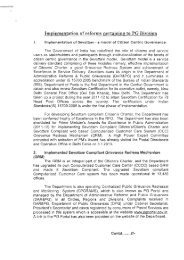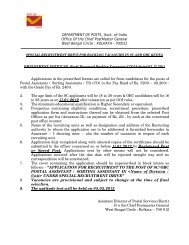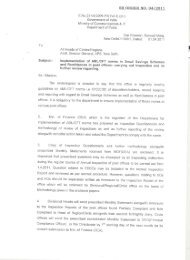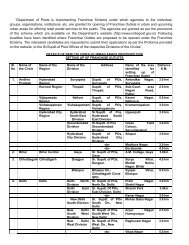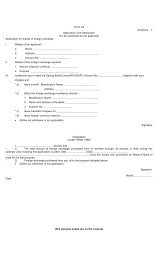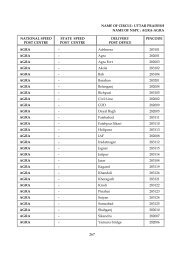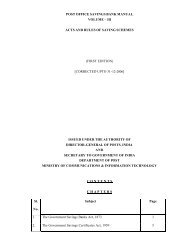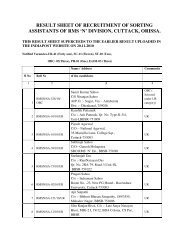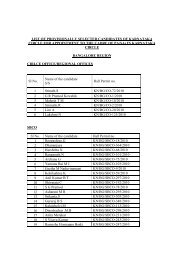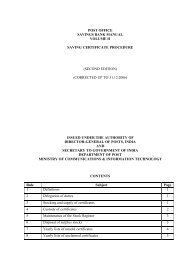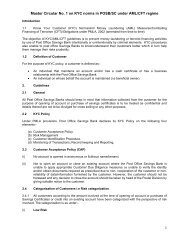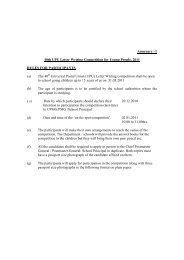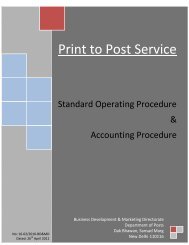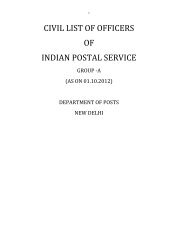The Indian Post Office Act, 1898 - India Post
The Indian Post Office Act, 1898 - India Post
The Indian Post Office Act, 1898 - India Post
Create successful ePaper yourself
Turn your PDF publications into a flip-book with our unique Google optimized e-Paper software.
<strong>The</strong> <strong><strong>India</strong>n</strong> <strong>Post</strong> <strong>Office</strong> <strong>Act</strong>, <strong>1898</strong>IntroductionCONTENTSSectionCHAPTER IPRELIMINARY1. Short title, extent, application and commencement2. Definitions3. Meanings of “in course of transmission by post” and “delivery”CHAPTER IIPRIVILEGE AND PROTECTION OF THE GOVERNMENT4. Exclusive privilege of conveying letters reserved to the Government5. Certain persons expressly forbidden to convey letters6. Exemption from liability for loss, misdelivery, delay or damageCHAPTER IIIPOSTAGE7. Power to fix rates of inland p ostage8. Power to make rules as to payment of postage and fees in certain cases9. Power to make rules as to registered newspapers10. Power to declare rates of foreign postage11. Liability for payment of postage12. Recovery of postage and other sums due in respect of postal articles13. Customs duty paid by the <strong>Post</strong> <strong>Office</strong> to be recoverable as postage14. <strong>Post</strong> <strong>Office</strong> marks prima facie evidence of certain facts denoted15. Official mark to be evidence of amount of postage.CHAPTER IVPOSTAGE STAMPS16. Provision of postage stamps and power to make rules as to them17. <strong>Post</strong>age stamps to be deemed to be stamps for the purpose of revenueCHAPTER VCONDITIONS OF TRANSMISSION OF POSTAL ARTICLES18. redelivery to sender of postal article in course of transmission by post19. Transmission by post of anything injurious prohibited19ATransmission by post of tickets, proposals, etc. relating to unauthorizedlotteries prohibited.20. Transmission by post of anything indecent, etc. prohibited21. Power to make rules as to transmission by post of postal articles22. Power to postpone dispatch or delivery of certain postal articles23. Power to deal with postal articles posted in contravention of <strong>Act</strong>
24. Power to deal with postal articles containing goods contraband or liableto duty24A Power to deliver such articles to, Customs authority25. Power to intercept notified goods during transmission by post26. Power to intercept postal articles for public good27. Power to deal with postal articles from abroad bearing fictitious orpreviously used stamps27A. Prohibition of transmission by post of certain newspapers27B. Power to detain newspapers and other articles being transmitted by post27C. Procedure for disposal by High Court of applications for release ofnewspapers and articles so detained.27D. Jurisdiction barred.CHAPTER VIREGISTRATION, INSURANCE AND VALUE-PAYABLE POST28. registration of <strong>Post</strong>al articles29: Power to make rules as to registration30. Insurance of postal articles31. Power to require insurance of postal articles32. Power to make rules as to insurance33. Liability in respect of postal articles insured34. Transmission by post of value-payable postal articles35. Power to make rules as to value-payable postal articles36. Power to give effect to arrangements with other countriesCHAPTER VIIUNDELIVERED POSTAL ARTICLES37. power to make rules as to disposal of undelivered postal articles38. Disposal of undelivered postal articles at office of <strong>Post</strong> Master General.39. Final disposal of undelivered postal articles.CHAPTER VIIISHIP LETTERS40. Duty of master of ship, departing from any port in <strong>India</strong> and not being a mailship, to convey mail bags.41. Duty of master of ship arriving at any port in <strong>India</strong> in respect of postal articlesand mail bags on board42. Allowances of gratuities for conveyance of postal articles by ships other thanmail ships.CHAPTER IXMONEY ORDERS43. Power to maintain money order system and to make rules as to remittancesthereby44. Power for remitter to recall money order or alter name of payee45. Power to provide for the issue of postal orders.46. Power to give effect to arrangements with other countries47. Recovery of money order paid to the wrong person48. Exemption from liability in respect of money orders.
CHAPTER XPENALTIES AND PROCEDUREOffences by <strong>Office</strong>rs of the <strong>Post</strong> <strong>Office</strong>49. Penalty for misconduct of person employed to carry or deliver mail bags orpostal articles.50. Penalty for voluntary withdrawal from duty, without permission or notice, ofperson employed to carry or delivery mail bags or postal articles.51. Penalty for making false entry in register kept by person employed to carry ordeliver any postal articles52. Penalty for theft, dishonest misappropriation, secretion, destruction, orthrowing away of postal articles53. Penalty for opening, detaining or delaying postal articles54. Penalty for fraud in connection with official marks and for receipt of excesspostage.55. Penalty for fraudulently preparing, altering, secreting or destroying <strong>Post</strong><strong>Office</strong> documents.56. Penalty for fraudulently sending unpaid postal articles57. Punishment of offences committed in a tribal area, acceding State or other<strong><strong>India</strong>n</strong> State.Other Offences58. Penalty for contravention of section 459. Penalty for contravention of section 560. Penalty for breach of rules under section 1661. Penalty for contravention of section 19, 19A or 20.62. Penalty for defiling or injuring post office letter-boxes.63. Penalty for affixing without authority thing to, or painting, tarring or disfiguringpost office or post office letter-boxes.64. Penalty for making false declaration.65. Penalty for master of ship failing to comply with the provisions of section 40or 41.66. Penalty for detention of letters on board vessel arriving in port.67. Penalty for detaining mails or opening mail bag.68. Penalty for retaining postal articles wrongly delivered or mail bags.69. Penalty for unlawfully diverting letters.General70. Penalty for abetting or attempting to commit, offences under act.71. Property in cases of offences to be laid in the <strong>Post</strong> <strong>Office</strong>.72. Authority for prosecutions under certain sections of <strong>Act</strong>.CHAPTER XISUPPLEMENTAL73. Zamindari and other district posts.74. General power to make rules and provisions as to rules under <strong>Act</strong>.75. Delegation of powers, other than rule-making powers to Director General.76. [Repealed]77. Saving
<strong>The</strong> <strong><strong>India</strong>n</strong> <strong>Post</strong> <strong>Office</strong> <strong>Act</strong>, <strong>1898</strong>(6 of <strong>1898</strong>)INTRODUCTIONIn 1866 the <strong>Post</strong> <strong>Office</strong> Ac t was enacted which wassubsequently amended by <strong>Act</strong> III of 1882 and <strong>Act</strong> XVI of 1896. Lateron number of defects were brought to the notice of the Government. Itwas also found that express provisions of law, as contained in the <strong>Act</strong>,in respect of various matters were not suited to the then prevailingrequirements of postal work. In order to rectify the defects the <strong><strong>India</strong>n</strong><strong>Post</strong> <strong>Office</strong> Bill was introduced in the Legislature.STATEMENT OF OBJECTS AND REASONS<strong>The</strong> present <strong>Post</strong> <strong>Office</strong> <strong>Act</strong> was enacted in 1866, and has beenamended since that date by the addition of three sections only. In1882 section 60A was added by <strong>Act</strong> III of 1882 authorising any officerof the <strong>Post</strong> <strong>Office</strong>, empowered in this behalf by the Governor Generalin Council, to search for newspapers regarding which a notification hasbeen published under the Sea Customs <strong>Act</strong>. In 1895, section 66 wasadded by <strong>Act</strong> III of that year, providing powers, in accordance with thegeneral policy of the <strong>Post</strong>al Union for dealing with fictitious ofpreviously used postage stamps of other countries found on letters orother articles received from abroad; and last year a further section wasadded by <strong>Act</strong> XVI of 1896 authorising the recovery of customs duty,when paid in advance by the <strong>Post</strong> <strong>Office</strong>, in the same manner aspostage under the <strong>Act</strong>.During the last thirty years certain defects and omissions in the<strong>Act</strong> of 1866 have been brought to light an experience has shown thatexpress provisions of law, as contained in the <strong>Act</strong>, in respect of variousmatters are not suited to the present requirements of postal work. Ithas also been found that further protection is needed by the <strong>Post</strong> <strong>Office</strong>and further powers to enable its officers, for instance, to deal witharticles posted in contravention of the <strong>Act</strong>. Various schemes,moreover, which have been introduced of late years such as postalinsurance and the value payable and money order systems haveremained outside the provisions of the <strong>Act</strong>, and now require to bebased on a legislative enactment. Finally, with the development of thepost office, and the knowledge of the course of English postallegislation, the necessity for some new penalties has becomeapparent.<strong>The</strong> present Bill proposes to supply the defects and omissionswhich have been brought to the notice in the <strong>Act</strong> of 1866, and to conferthe protection and powers which have been found necessary in theextension and increase of postal business. It includes within its scope
postal insurance, the value payable post, and the <strong>Post</strong> <strong>Office</strong> moneyorder system, and declares and limits the liability of Government inrespect of these matters. <strong>The</strong> Bill is to a large extent an enabling billreserving to Government the power of dealing by rule with numerousquestions of postal practice and procedure affecting the public ….”Gazette of <strong>India</strong>, 1897, Pt. V, p.385.ACT 6 OF <strong>1898</strong><strong>The</strong> <strong><strong>India</strong>n</strong> <strong>Post</strong> <strong>Office</strong> Bill having been passed by theLegislature received its assent on 22 nd March <strong>1898</strong>. It came into forceon 1 st July, <strong>1898</strong> as THE INDIAN POST OFFICE ACT, <strong>1898</strong> (6 of<strong>1898</strong>).THE INDIAN POST OFFICE ACT, <strong>1898</strong>(6 OF <strong>1898</strong>)An <strong>Act</strong> to consolidate and amend the law relating to the <strong>Post</strong><strong>Office</strong>s in <strong>India</strong>.Whereas it is expedient to consolidate and amend the lawrelating to the <strong>Post</strong> <strong>Office</strong>s in <strong>India</strong>; It is hereby enacted as follows:-CHAPTER IPRELIMINARY1. Short title, extent, application and commencement.-(1) This <strong>Act</strong> may be called the <strong><strong>India</strong>n</strong> <strong>Post</strong> <strong>Office</strong> <strong>Act</strong>, <strong>1898</strong>.(2) It extends to the whole of <strong>India</strong> and it applies also to all citizens of<strong>India</strong> outside <strong>India</strong>.(3) It shall come into force on the first day of July, <strong>1898</strong>.2. Definitions.- In this <strong>Act</strong>, unless there is anythingrepugnant in the subject or context, -(a) the expression “Director General” means the Director General of<strong>Post</strong>s and Telegraphs;(b) the expression “inland”, used in relation to a postal article, means—(i)(ii)posted in [<strong>India</strong>] and addressed to any place in [<strong>India</strong>] or toany place for which a post office is established by the[Central Government] beyond the limits of [<strong>India</strong>] orposted at any post office established by the [CentralGovernment] beyond the limits of [<strong>India</strong>] and addressed toany place for which any such post office is established or toany place in [<strong>India</strong>]:
[Provided that the expression “inland” shall not apply to anyclass of postal articles whic h may be specified in this behalf by the[Central Government] by notification in the [Official Gazette], whenposted in or at or addressed to any places of post offices which may bedescribed in such notification;](c) the expression “mail ship” includes a bag, box, parcel or any otherenvelope or covering in which postal articles in course of transmissionby post are conveyed whether It does or does not contain any sucharticle;(d) the expression “mail ship” means a ship employed for carryingmails, pursuant to contract or continuing arrangement, by the CentralGovernment or Her Majesty’s Government or the Government of anyBritish possession or foreign country:(e) the expression “officer of the <strong>Post</strong> <strong>Office</strong>” includes any personemployed in any business of the <strong>Post</strong> <strong>Office</strong> or on behalf of the <strong>Post</strong><strong>Office</strong>.(f) the expression “postage” means the duty chargeable for thetransmission by post of postal articles;(g) the expression “postage stamps” means any stamp provided by the[Central Government] for denoting postage or other fees or sumspayable in respect of postal articles under this<strong>Act</strong>, and includes adhesive postage stamps and stamps printed,embossed, impressed or otherwise indicated on any envelope,wrapper, postcard or other article;(h) the expression “post office” includes every house, building, room,carriage or place used for the purposes of the <strong>Post</strong> <strong>Office</strong>, and everyletter-box provided by the <strong>Post</strong> <strong>Office</strong> for the reception of postalarticles;(i) the expression “postal article” includes a letter, postcard,newspaper, book, pattern or sample packet, parcel and every article orthing transmissible by post:(j) the expression “<strong>Post</strong> Master General” includes a Deputy <strong>Post</strong>Master General or other officer exercising the powers of a <strong>Post</strong> MasterGeneral: and(k) the expression “<strong>Post</strong> <strong>Office</strong>” means the department, [established forthe purposes of carrying the provisions of this <strong>Act</strong> into effect and]presided over by the Director General.3. Meanings of “in course of transmission by post” and“delivery”.- For the purposes of this <strong>Act</strong>, -
(a) a postal article shall be deemed to be in course of transmission bythe post from the time of its being delivered to a post office to the timeof its being delivered to the addressee or of its being returned to thesender or otherwise disposed of under Chapter VII;(b) the delivery of a postal article of any description to a postman orother person authorized to receive postal articles of that description forthe post shall be deemed to be a delivery to a post office; and(c) <strong>The</strong> delivery of a postal article at the house or office of theaddressee, or to the addressee or his servant or agent or other personconsidered to be authorized to receive the article according to theusual manner of delivering postal artic les to the addressee, shall bedeemed to be delivery to the addressee.CHAPTER IIPRIVILEGE AND PROTECTION OF THE GOVERNMENT4. Exclusive privilege of conveying letters reserved to theGovernment.- (1) Wherever within <strong>India</strong> posts or postalcommunications are established by the Central Government, theCentral Government shall have the exclusive privilege of conveying bypost, from one place to another, all letters except in the followingcases, and shall also have the exclusive privilege of performing all theincidental services of receiving, collecting, sending, desptaching anddelivering all letters, except in the following cases that is to say:-(a) letters sent by a private friend in his way, journey or travel, tobe delivered by him to the person to whom they are directed,without hire, reward or other profit or advantages for receiving,carrying or delivering them;(b) letters solely concerning the affairs of the sender or receiverthereof, sent by a messenger on purpose; and(c) letters solely concerning goods or property sent either by seaor by land to be delivered with the goods or property which theletters concern, without hire, reward or other profit oradvantage for receiving, carrying or delivering them:Provided that nothing in this section shall authorize any person tomake a collection of letters excepted as aforesaid for the purpose ofsending them otherwise than by post.(2) For the purposes of this Section and Section-5, the expression“letters” includes <strong>Post</strong>cards.5. Certain persons expressly forbidden to convey letter. -Wherever within (<strong>India</strong>) posts or postal communications areestablished by the Central Government, the following persons are
expressly forbidden to collect, carry, tender or deliver letters, or toreceive letters for the purpose of carrying or delivering them, althoughthey obtain no hire, reward or other profit or advantage for so doing,that is to say:-(a) common carriers of passengers or goods, and their servants oragents, except as regards letters solely concerning goods in their cartsor carriages; and(b) owners and masters of vessels sailing or passing on any river orcanal in [<strong>India</strong>], or between any ports or places in [<strong>India</strong>] and theirservants or agents, except as regards letters solely concerning goodson board, and except as regards postal articles received forconveyance under Chapter VIII.6. Exemption from liability for loss, misdelivery, delay ordamage.- <strong>The</strong> [Government] shall not incur any liability by reason ofthe loss, misdelivery or delay of, or damage to, any postal article incourse of transmission by post, except in so far as such liability may inexpress terms be undertaken by the Central Government ashereinafter provided; and no officer of the <strong>Post</strong> <strong>Office</strong> shall incur anyliability by reason of any such loss, misdelivery, delay or damage,unless he has caused the same fraudulently or by his willful act ordefault.CHAPTER IIIPOSTA GE7 . Power to fix rates of inland postage- (1) <strong>The</strong> CentralGovernment may, by notification in the Official Gazette, fix the rates ofpostage and other sums to be charged in respect of postal articles sentby the inland post under this <strong>Act</strong>, and may make rules as to the scaleof weights, terms and conditions subject to which the rates so fixedshall be charged:Provided that the highest rate of postage when prepaid, shall notexceed the rate set forth for each class of postal articles in the FirstSchedule(2) Unless and until such notification as aforesaid is issued, the ratesset forth in the said Schedule shall be the rates chargeable under this<strong>Act</strong>.(3) <strong>The</strong> Central Government may, by notification in the Official Gazette,declare what packets may be sent by the inland post as book, patternand sample packets within the meaning of this <strong>Act</strong>.8. Power to make rules as to payment of postage and fees incertain cases. <strong>The</strong> Central Government may, by rule,-
(a)(b)(c)(d)require the prepayment of postage on inland postal articles orany class of inland postal articles and prescribe themanner in which prepayment shall be made;prescribe the postage to be charged on inland postal articleswhen the postage is not prepaid or is insufficiently prepaid;Provide for the redirection of postal articles and thetransmission by post of articles so redirected, either free ofcharge or subject to such further charge as may be specified inthe rules; andprescribe the fees to be charged for the “express delivery” ofpostal articles, in addition to, or instead of, any other postagechargeable thereon under this <strong>Act</strong>.Explanation : “Express delivery” means delivery by a specialmessenger or conveyance.9. Power to make rules as to registered newspapers.- (1)[Central Government] may make rules providing for the registration ofnewspapers for transmission by inland post as registered newspapers.(2) For the purpose of such registration, every publication,consisting wholly or in great part of political or other news, or of articlesrelating thereto or to other current topics, with or withoutadvertisements, shall be deemed a newspaper, subject to the followingconditions, namely:-(a)(b)that it is published in numbers at intervals of not more thanthirty one days; andthat it has a bona fide list of subscribers(3) An extra or supplement to a newspaper, bearing the same dateas the newspaper and transmitted therewith, shall be deemed to bepart of the newspaper:Provided that no such extra or supplement shall be so deemedunless it consists wholly or in great part of matter like that of thenewspaper and has the title and date of publication of the newspaperprinted at the top of each page.Explanation.- Nothing in this section or in the rules thereundershall be construed to render it compulsory to send newspapers by theinland post.10. Power to declare rates of foreign postage-(1) Where arrangements are in force with the United Kingdom, or withany British possession or foreign country, for the transmission by post
of postal articles between (<strong>India</strong>) and the United Kingdom or suchpossession or country, the Central Government may, in conformity withthe provisions of such arrangements, declare what postage rates andother sums shall be charged in respect of such postal articles, andmay make rules as to the scale of weight, terms and conditions subjectto which the rates so declared shall be charged.(2) Unless and until such declaration as aforesaid is made, the existingrates and regulations shall continue in force.11. Liability for payment of postage. – (1) <strong>The</strong> addressee of a postalarticle on which postage or any other sum chargeable under this <strong>Act</strong> isdue, shall be bound to pay the postage or sum so chargeable on hisaccepting delivery of the postal article, unless he forthwith returns itunopened:Provided that, if any such postal article appears to thesatisfaction of the <strong>Post</strong> Master General to have been maliciously sentfor the purpose of annoying the addressee, he may remit the postage.(2) If any postal article on which postage or any other sum chargeableunder this <strong>Act</strong> is due, is refused or returned as aforesaid, or if theaddressee is dead or cannot be found, then the sender shall be boundto pay the postage or sum due thereon under this <strong>Act</strong>.12. Recovery of postage and other sums due in respect ofpostal articles.- If any person refuses to pay any postage or other sumdue from him under this <strong>Act</strong> in respect of any postal article, the sum sodue may, on application made by an officer of the <strong>Post</strong> <strong>Office</strong>authorized in this behalf by the written order of the <strong>Post</strong> MasterGeneral, be recovered for the use of the <strong>Post</strong> <strong>Office</strong> from the person sorefusing, as if it were a fine imposed under this <strong>Act</strong>, by any Magistratehaving jurisdiction where that person may for the time being beresident; and the <strong>Post</strong> Master General may further direct that any otherpostal article, not being on [Government] service, addressed to thatperson shall be withheld from him until the sum so due is paid orrecovered as aforesaid.13. Customs duty paid by the <strong>Post</strong> <strong>Office</strong> to be recoverable aspostage.- When a postal article, on which any duty of customs ispayable, has been received by post from any place beyond the limits of[<strong>India</strong>], and the duty has been paid by the postal authorities at anycustoms-port or elsewhere, the amount of the duty shall be recoverableas if it were postage due under this <strong>Act</strong>.14. <strong>Post</strong> <strong>Office</strong> marks prima facie evidence of certain factsdenoted.- In every proceeding for the recovery of any postage or othersum alleged to be due under this <strong>Act</strong> in respect of a postal article,-
(a)(b)the production of the postal article, having thereon the officialmark of the <strong>Post</strong> <strong>Office</strong> denoting that the article has beenrefused, or that the addressee is dead or cannot be found,shall be prima facie evidence of the fact so denoted, andthe person from whom the postal article purports to havecome, shall, until the contrary is proved, be deemed to be thesender thereof.15. Official mark to be evidence of amount of postage. - <strong>The</strong>official mark on a postal article denoting that any postage or other sumis due in respect thereof to the <strong>Post</strong> <strong>Office</strong> of [<strong>India</strong>] or to the <strong>Post</strong><strong>Office</strong> of the United Kingdom or of any British possession or foreigncountry, shall be prima facie evidence that the sum denoted asaforesaid is so due.CHAPTER IVPOSTAGE STAMPS16. Provision of postage stamps and power to make rules as tothem. – (1) <strong>The</strong> Central Government shall cause postage stamps tobe provided of such kinds and denoting such values as it may thinknecessary for the purposes of this <strong>Act</strong>,(2) <strong>The</strong> Central Government may make rules as to the supply, saleand use of postage stamps.(3) In particular and without prejudice to the generality of theforegoing power, such rules may-(a)fix the price at which postage stamps shall be sold;(b) declare the classes of postal articles in respectof which postage stamps, shall be used for thepayment of postage or other sums chargeable underthis <strong>Act</strong>;(c)prescribe the conditions with regard to perforation,defacement and all other matters subject to whichpostage stamps may be accepted or refused inpayment of postage or other sums;(d) (d) regulate the custody, supply and sale ofpostage stamps;(e)declare the persons by whom and the terms andconditions subject to which postage stamps may besold; and
(f) prescribe the duties and remuneration of personsselling postage stamps.17. <strong>Post</strong>age stamps to be deemed to be stamps for the purposeof revenue.- (1) <strong>Post</strong>age stamps provided under section 16 shall bedeemed to be stamps issued by Government for the purpose ofrevenue within the meaning of the <strong><strong>India</strong>n</strong> Penal Code (45 of 1860) and,subject to the other provisions of this <strong>Act</strong>, shall be used for theprepayment of postage or other sums chargeable under this <strong>Act</strong> inrespect of postal articles, except where the Central Government directsthat prepayment shall be made in some other way.[(2) Where the Central Government has directed that prepayment ofpostage or other sums chargeable under this <strong>Act</strong> in respect of postalarticles may be made by prepaying the value denoted by theimpressions of stamping machines issued under its authority, theimpression of any such machine shall likewise be deemed to be astamp issued by Government for the purpose of revenue, within themeaning of the <strong><strong>India</strong>n</strong> Penal Code (45 of 1860).]CHAPTER VCONDITIONS OF TRANSMISSION OF POSTAL ARTICLES18. Redelivery to sender of postal article in course oftransmission by post.- (1) <strong>The</strong> [Central Government] may, byrule, provide for the redelivery to the sender, without reference to theconsent of the addressee and subject to such conditions (if any), asmay be deemed fit, of any postal article in course of transmission bypost.(2) Save as provided by any rules that may be made under subsection(1), the sender shall not be entitled to recall a postal article incourse of transmission by post.19. Transmission by post of anything injurious prohibited.- (1)Except as otherwise provided by rule and subject to such conditions asmay be prescribed thereby, no person shall send by post anyexplosive, dangerous, filthy, noxious or deleterious substance, anysharp instrument not properly protected, or any living creature which iseither noxious or likely to injure postal articles in course of transmissionby post or any officer of the <strong>Post</strong> <strong>Office</strong>.(2) No person shall send by post any article or thing which is likelyto injure postal articles in course of transmission by post or any officerof the <strong>Post</strong> <strong>Office</strong>.[19A. Transmission by post of tickets, proposals, etc., relating tounauthorized lotteries prohibited. – No person shall send by post, --
(a)(b)any ticket, proposal or advertisement relating to a lottery; orany other matter descriptive of, or otherwise relating to, alottery, which is calculated to act as an inducement topersons to participate in that lottery.Explanation.—In this section “lottery” does not include a lotteryorganized or authorised by the Government.]20. Transmission by post of anything indecent, etc.,prohibited.—No person shall send by post--(a) any indecent or obscene printing, painting, photograph,lithograph, engraving, book or card, or any other indecent orobscene article, or(b) any postal article having thereon, or on the cover thereof, anywords, marks or designs of an indecent, obscene, seditious,scurrilous, threatening or grossly offensive character.21. Power to make rules as to transmission by post of postalarticles.- (1) <strong>The</strong> Central Govt. may make rules as to thetransmission of articles by post.(2) In particular and without prejudice to the generality of the foregoingpower, such rules may-(a) specify articles which may not be transmitted by post;(b) prescribe conditions on which articles may be transmitted by post;(c) provide for the detention and disposal of articles in course oftransmission by post in contravention of rules made under clause(a) or clause (b);(d) provide for the granting of receipts for, and the granting andobtaining of certificates of, posting and delivery of postal articlesand the sums to be paid, in addition to any other postage, for suchreceipts and certificates; and(e) regulate covers, forms, dimensions, maximum weights, andenclosures, and the use of postal articles, other than letters, formaking communications.](3) <strong>Post</strong>al articles shall be posted and delivered at such items and insuch matter as the Director General may, by order, from time to time,appoint.22. Power to postpone dispatch or delivery of certain postalarticles.-- (1) where the dispatch or delivery from a post office ofletters would be delayed by the dispatch or delivery there from at thesame time of book, pattern or sample packets and parcels, or any ofthem, such packets or parcels, or any of them, may, subject to suchrules as the Central Government may make in this behalf, be detainedin the <strong>Post</strong> <strong>Office</strong> so long as may be necessary.
(2) Where separate parcel posts are established, parcels may beforwarded and conveyed by them, being detained, if necessary, in the<strong>Post</strong> <strong>Office</strong> for that purpose.23. Power to deal with postal articles posted in contraventionof <strong>Act</strong>.- (1) Any postal article sent by post in contravention ofany of the provisions of this <strong>Act</strong> may be detained and either returned tothe sender or forwarded to destination, in each case charged with suchadditional postage (if any), as the [Central Government] may, by rule,direct.(2) any officer in charge of a post office or authorised by the<strong>Post</strong>master General in this behalf may open or unfasten anynewspaper or any book, pattern or sample packet, in course oftransmission by post, which he suspects to have been sent by post incontravention of [Section 20, clause (a), or of] Section 21 or of any ofthe provisions of this <strong>Act</strong> relating to postage.3. Notwithstanding anything in sub-section (1)--(a)any postal article sent by post in contravention of theprovisions of section 19 [or section 19A] may, under theauthority of the <strong>Post</strong> Master General, if necessary, beopened and destroyed; and[(b)any postal article sent by post in contravention of the provisionsof section 20 may be disposed of in such manner as the CentralGovernment may, by rule, direct.]24. Power to deal with postal articles containing goodscontraband or liable to duty.- [Except as otherwise provided in this<strong>Act</strong>, where a postal article suspected to contain any goods of which theimport by post or the transmission by post is prohibited by or under anyenactment for the time being in force,] or anything liable to duty, isreceived for delivery at a post office, the officer in charge of the postoffice shall send a notice in writing to the addressee inviting him toattend, either in person or by agent, within a specified time at the postoffice, and shall in the presence of the addressee or his agent, or if theaddressee or his agent fails to attend as aforesaid then in his absence,open and examine the postal article:Provided, first that, if the Director-General so directs in the caseof any post office or class of post offices, the officer in charge of thepost office shall call in two respectable persons as witnesses before heopens a postal article in the absence of the addressee or his agent:Provided, secondly, that in all cases a postal article, after beingopened under this section, shall be delivered to the addressee, unlessit is required for the purpose of any further proceeding under this or any
other law or enactment for the time being in force and that the openingof the postal article and the circumstances connected therewith shallbe immediately reported to the <strong>Post</strong> Master General.[24A. Power to deliver such articles to customs authority.- <strong>The</strong>Central Government. may, by general or special order, empower anyofficer of the <strong>Post</strong> <strong>Office</strong>, specified in such order, to deliver postalarticle, received from beyond the limits of (<strong>India</strong> and suspectedto contain anything liable to duty, to such Customs authority as maybe specified in the said order, and such Customs authority shall dealwith such article in accordance with the provisions of Sea Customs<strong>Act</strong>, 1878 (8 of 1878), or of any other law for the time being in force.]25. Power to intercept notified goods during transmission bypost.- Where a notification has been published under section 19 of theSea Customs <strong>Act</strong>, 1878 (8 of 1878), in respect of any goods of anyspecified description [or where the import or export into or from [<strong>India</strong>]of goods of any specified description has been prohibited or restrictedby or under any other enactment for the time being in force], anyofficer of the <strong>Post</strong> <strong>Office</strong> empowered in this behalf by the [CentralGovernment] may search or cause search to be made, for any suchgoods in course of transmission by post, and shall deliver [all postalarticles reasonably believed or found to contain such goods] to suchofficer as the [Central Government] may appoint in this behalf and suchgoods may be disposed of in such manner as the [CentralGovernment] may direct. [In carrying out any such search, such officerof the <strong>Post</strong> <strong>Office</strong> may open or unfasten, or cause to be opened orunfastened, any newspaper or any book, pattern or sample packet incourse of transmission by post].26. Power to intercept postal articles for public good.- (1) Onthe occurrence of any public emergency, or in the interest of the publicsafety or tranquility, the [Central Government], or a [StateGovernment], or any officer specially authorised in this behalf [by theCentral or the [State Government] may, by order in writing, direct thatany postal article or class or description of postal articles in course oftransmission by post shall be intercepted or detained, or [shall bedisposed of in such manner as the authority issuing the order maydirect].(2) If any doubt arises as to the existence of a public emergency, oras to whether any act done under sub-section (1) was in the interest ofthe public safety or tranquility, a certificate [of the Central Governmentor, as the case may be, of the [State Government] shall be conclusiveproof on the point.27. Power to deal with postal articles from abroad bearingfictitious or previously use stamps.- Where a postal article isreceived by post from any place beyond the limits of [<strong>India</strong>]—
(a)(b)bearing a fictitious postage stamp, that is to say, anyfacsimile or imitation or representation of a postage stamp,orpurporting to be prepaid with any postage stamp which hasbeen previously used to prepay any other postal article,the officer in charge of the post office at which the postal article isreceived, shall send a notice to the addressee inviting him to attend,either in person or by agent, within a specified time at the post office toreceive delivery of the postal article.(2) If the addressee or his agent attends at the post office within thetime specified in the notice and consents to make known to the officerin charge of the post office the name and address of the sender of thepostal article and to redeliver to the officer aforesaid the portion of thepostal article which bears the address and the fictitious or previouslyused postage stamp, or, if the postal article is inseparable from thestamp, the entire postal article, the postal article shall be delivered tothe addressee or his agent.(3) If the addressee or his agent fails to attend at the post officewithin the time specified in the notice, or having attended within thattime, refuses to make known the name and address of the sender or toredeliver the postal article or portion thereof as required by sub-section(2), the postal article shall not be delivered to him, but shall bedisposed of in such manner as the [Central Government] may direct.Explanation:- For the purposes of this section, the expression “postagestamp” includes any postage stamp for denoting any rate or duty ofpostage of any part of [<strong>India</strong> or of His Majesty’s dominions] or foreigncountry [and the impression of any stamping machine provided orauthorised for the like purpose by or under the authority of theGovernment of such [part or country]27A. Prohibition of transmission by post of certainnewspapers.—No newspaper printed and published in [<strong>India</strong>] withoutconforming to the rules laid down in the Press and Registration ofBooks <strong>Act</strong>, 1867 (25 of 1867), shall be transmitted by post.27B Power to detain newspapers and other articles beingtransmitted by post.- (1) Any officer of the <strong>Post</strong> <strong>Office</strong> authorized bythe <strong>Post</strong> Master General in this behalf may detain any postal article incourse of transmission by post which he suspects to contain—(a)(i) any newspaper or book as defined in the Press and Registrationof Books <strong>Act</strong>, 1867 (25 of 1867), ; or(ii) any document; containing any seditious matter, that is to say,any matter the publication of which is punishable under section 124A ofthe <strong><strong>India</strong>n</strong> Penal Code (45 of 1860); or
(b) any newspaper as defined in the Press and Registration ofBooks <strong>Act</strong>, 1867 (25 of 1867), edited, printed or published otherwisethan in conformity with the rules laid down in this <strong>Act</strong>;and shall deliver any postal article so detained to such officer as the[State Government] may appoint in this behalf.2. Any officer detaining any postal article under the provisions ofsub-section (1) shall forthwith send by post to the addressee of sucharticle, notice of the fact of such detention.(3) <strong>The</strong> [State Government] shall cause the contents of any postalarticle detained under sub-section (1) to be examined, and, if it appearsto the [State Government] that the article contained any newspaper,book or other document, of the nature described in clause (a) or clause(b) of sub-section (1), may pass such orders as to the disposal of thearticle and its contents as it may deem proper, and, if it does not soappear, shall release the article and its contents, unless the same beotherwise liable to seizure under any law for the time being in force:Provided that any person interested in any article detainedunder the provisions of clause (a) or sub-section (1), may, within twomonths from the date of such detention, apply to the [StateGovernment] for release of the same, and the [State Government] shallconsider such application and pass such orders thereon as it maydeem to be proper:Provided also that, if such application is rejected, the applicantmay, within two months from the date of the order rejecting theapplication, apply to the High Court for release of the article and itscontents on the ground that the article did not contain any newspaper,book or other document containing any seditious matter.(4) In this section “document” includes also any painting, drawing orphotograph, or other visible representation.27C Procedure for disposal of High Court of applications forrelease of newspapers and articles so detained.- Every applicationmade under the second provisio to Sub-Section (3) of Section 27-Bshall be heard and determined in the manner provided by Sections 99D to 99 F of the Code of Criminal Procedure, <strong>1898</strong> (5 of <strong>1898</strong>), by aSpecial bench of the High Court constituted in the manner provided bySection 99 C of that Code.27D. Jurisdiction barred.- No order passed or action taken undersection 27-B shall be called in question in any court otherwise than inaccordance with the second proviso to sub- section (3) of that section.]
CHAPTER VIREGISTRATION, INSURANCE AND VALUE-PAYABLE POST28. Registration of <strong>Post</strong>al articles.- <strong>The</strong> sender of a postal articlemay, subject to the other provisions of this <strong>Act</strong>, have the articleregistered at the post office at which it is posted, and require a receipttherefore; and the [Central government] may, by notification in the[Official Gazette], direct that, in addition to any postage chargeableunder this <strong>Act</strong>, such further fee as may be fixed by the notification shallbe paid on account of the registration of postal articles.29. Power to make rules as to registration.- (1)<strong>The</strong> CentralGovernment may make rules as to the registration of postal articles.(2) In particular and without prejudice to the generality of the foregoingpower, such rules may-(a) declare in what cases registration shall be required;(b) prescribe the manner in which the fees for registration shall bepaid; and(c) direct that twice the fee for registration shall be levied on thedelivery of a postal article required to be registered on which the fee forregistration has not been prepaid.(3) <strong>Post</strong>al articles made over to the Pos t <strong>Office</strong> for the purpose of beingregistered, shall be delivered, when registered, at such times and insuch manner as the Director General may, by order, from time to timeappoint.30. Insurance of postal articles.- <strong>The</strong> [Central Government]may, by notification in the [Official Gazette], direct-(a)(b)that any postal article may, subject to the other provisions ofthis <strong>Act</strong>, be insured at the post office at which it is posted,against the risk of loss or damage in course of transmissionby post, and that a receipt therefore shall be granted to theperson posting it; andthat, in addition to any postage and fees for registrationchargeable under this <strong>Act</strong>, such further fee as may be fixedby the notification shall be paid on account of the insuranceof postal articles.31. Power to require insurance of postal articles.- <strong>The</strong>[Central Government] may, by notification in the [Official Gazette],declare in what case insurance shall be required, and direct that anypostal article containing anything required to be insured, which hasbeen posted without being insured, shall be returned to the sender orshall be delivered to the addressee, subject to the payment of suchspecial fee as may be fixed by the notification:
Provided that the levy of such special fee as aforesaid shall notimpose any liability upon [the Central Government] in respect of thepostal article.32. Power to make rules as to insurance.- (1) <strong>The</strong> [CentralGovernment] may make rules as to the insurance of postal articles.(2) in particular and without prejudice to the generality of theforegoing power, such rules may-(a) declare what classes of postal articles may be insured undersection 30;(b) fix the limit of the amount for which postal articles may beinsured; and(c) prescribe the manner in which the fees for insurance shall bepaid.3. <strong>Post</strong>al articles made over to the <strong>Post</strong> <strong>Office</strong> for the purpose ofbeing insured, shall be delivered, when insured, at such places andtimes and in such manner as the Director General may, by order, fromtime to time, appoint.33. Liability in respect of postal articles insured. - Subject tosuch conditions and restrictions as the [Central Government] may, byrule, prescribe [the Central Government] shall be liable to paycompensation, not exceeding the amount for which a postal article hasbeen insured, to the sender thereof for the loss of the postal article orits contents, or for any damage caused to it in course of transmissionby post:Provided that the compensation so payable shall in no caseexceed the value of the article lost or the amount of the damagecaused.34. Transmission by post of value-payable postal articles.-<strong>The</strong> [Central Government] may, by notification in the [officialGazette], direct that, subject to the other provisions, of this <strong>Act</strong> and tothe payment of fees at such rates as may be fixed by the notification, asum of money specified in writing at the time of posting by the senderof a postal article shall be recoverable on the delivery thereof from theaddressee, and that the sum, so recovered, shall be paid to the sender:Provided that [the Central Government shall not] incur anyliability in respect of the sum specified for recovery, unless and untilthat sum has been received from the addressee.Explanation.- <strong>Post</strong>al articles sent in accordance with theprovisions of this section may be described as “value-payable” postalarticles.
35. Power to make rules as to value-payable postal articles.- (1)<strong>The</strong> [Central Government] may make rules as to the transmission bypost of value-payable postal articles.(2) In particular and without prejudice to the generality of theforegoing power, such rules may--(a)(b)(c)(d)[(e)(e)declare what classes of postal articles may be sent as valuepayablepostal articles;direct that no postal article shall be so sent unless the senderdeclares that it is sent in execution of a bona fide orderreceived by him;limit the value to be recovered on the delivery of any valuepayablepostal article;prescribe the form of declaration to be made by the sendersof value-payable postal articles, and the time and manner ofthe payment of fees;provide for the retention and repayment to the addressee incases of fraud of money recovered on the delivery of anyvalue-payable postal article; andprescribe the fees to be charged for inquiries into complaintsregarding the delivery of or payment for value-payable postalarticle.](3) <strong>Post</strong>al articles shall be made over to the <strong>Post</strong> <strong>Office</strong> for thepurpose of being sent as “value-payable” and shall be delivered,when so sent, at such times and in such manner as the Director-General may, by order, from time to time, appoint.[(4) No suit or other legal proceeding shall be institutedagainst [the Central Government] or any officer of the <strong>Post</strong> <strong>Office</strong> inrespect of anything done, or in good faith purporting to be doneunder any rule made under clause (e) of sub-section (2).]36. Power to give effect to arrangements with other countries.-(1) Where arrangement made with the United Kingdom, or with anyBritish possession, or foreign country are in force], for the transmissionby post of registered, insured or value payable postal articles between<strong>India</strong> and the United Kingdom or such possession or country, theCentral Government may make rules to give effect to sucharrangements.(2) In particular and without prejudice to the generality of theforegoing power, such rules may prescribe-(a)(b)the form of declaration to be made by the senders of suchpostal articles as aforesaid; andthe fees to be charged in respect thereof.
CHAPTER VIIUNDELIVERED POSTAL ARTICLES37. Power to make rules as to disposal of undelivered postalarticles.- (1) Central Government may make rules as to thedisposal of postal articles which for any reason cannot be delivered(hereinafter referred to as “undelivered postal articles”)(2) In particular without prejudice to the generality of the foregoingpower, such rules may-(a) prescribe the period during which undelivered postal articles at apost office shall remain in that office; and(b) provide for the publication of lists of undelivered postal articles,or of any class of undelivered postal articles.(3) Every undelivered postal article, after being detained at a post officefor the period prescribed by rule under the foregoing provisions of thisSection, shall be either forwarded, free of further charge, to the postoffice at which it was posted, for return to the sender, or sent to theoffice of the <strong>Post</strong>master General.38. Disposal of undelivered postal articles at office of <strong>Post</strong>Master General.- (1) Every postal article received at the office of the<strong>Post</strong> Master General under sub-section (3) of section 37 shall be dealtwith as follows:-(a) if practicable, it shall be redirected and forwarded by post to theaddressee; or(b) if it cannot be redirected and forwarded as aforesaid, it shall beopened by some officer, appointed by the <strong>Post</strong> Master General in thisbehalf and bound to secrecy, in order to ascertain the name andaddress of the sender.(2) If the name and address of the sender are so ascertained, it shallbe returned by post to the sender, free of further charge or subject tosuch further charge as the Central Government may, by rule, direct.39. Final disposal of undelivered postal articles.- Undeliveredpostal articles which cannot be disposed of under the foregoingprovisions, shall be detained in the office of the <strong>Post</strong> master General forsuch further period (if any), and shall be dealt with in such manner, asthe [Central Government] may, by rule, direct:Provided that –
(a) letters and postcards shall be destroyed;(b) money or saleable property, not being of a perishable nature, foundin any undelivered postal article, shall be detained for a period of oneyear in the office of the <strong>Post</strong> Master General, and, if on the expirationof that period no person has established his right thereto, shall, ifmoney, be credited to the <strong>Post</strong> <strong>Office</strong>, and, if saleable property, besold, the sale-proceeds being credited to the <strong>Post</strong> <strong>Office</strong>.CHAPTER VIIISHIP LETTERS40. Duty of master of ship, departing from any port in <strong>India</strong> andnot being a mail ship, to convey mail bags.- <strong>The</strong> master of ship, notbeing a mail ship, about to depart from any port in [<strong>India</strong>] to any portwithin, or any port or place beyond, [<strong>India</strong>], shall receive on board anymail bag tendered to him by any officer of the <strong>Post</strong> <strong>Office</strong> forconveyance, granting a receipt therefore in such form as the [CentralGovernment] may, by rule, prescribe and shall, without delay, deliverthe same at the port or place of destination.41. Duty of master of ship arriving at any port in <strong>India</strong> inrespect of postal articles and mail bags on board.- (1) <strong>The</strong> masterof a ship arriving at any port in [<strong>India</strong>] shall, without delay, cause everypostal article or mail bag on board which is directed to that port and iswithin the exclusive privilege conferred on the [Central Government] bysection 4, to be delivered either at the post office at that port or to someofficer of the <strong>Post</strong> <strong>Office</strong> authorized in this behalf by the <strong>Post</strong> MasterGeneral.(2) If there is on board any postal article or mail bag which isdirected to any other place within [<strong>India</strong>] and is within the exclusiveprivilege aforesaid, the master shall, without delay, report the fact tothe officer in charge of the post office at the port of arrival and actaccording to the directors he may receive from such officer, and thereceipt of such officer shall discharge him from all further responsibilityin respect of the postal article or mail bag.42. Allowances of gratuities for conveyance of postal articlesby ships other than mail ships. – <strong>The</strong> [Central Government] may, bynotification in the [Official Gazette], declare what gratuities shall beallowed to masters of ships, not being mail ships, in respect of postalarticles received by them for conveyance on behalf of the post office;and the master of a ship, not being a mail ship, about to leave any portin [<strong>India</strong>] as aforesaid shall, if he received on board a mail bag forconveyance, be entitled to demand and obtain immediately the amountof the gratuity payable under this section in respect of the mail bag andits contents.
CHAPTER IXMONEY ORDERS43. Power to maintain money order system and to make rulesas to remittances thereby.- (1) <strong>The</strong> Central Government may providefor the remitting of small sums of money through the <strong>Post</strong> <strong>Office</strong> bymeans of money orders and may make rules as to such money orders.(2) In particular and without prejudice to the generality of the foregoingpower, such rules may prescribe-(a) the limit of amount for which money orders may be issued;(b) the period during which money orders shall remain current; and(c) the rates of commission or the fees to be charged on money ordersor in respect thereof44. Power for remitter to recall money-order or alter name ofpayee. (1) Subject to such conditions as the [Central Government]may, by rules made under section 43, prescribe in respect of the levyof additional rates of commission or fees or any other matters, a personremitting money through the <strong>Post</strong> <strong>Office</strong> by means of a money-ordermay require that the amount of the order, if not paid to the payee, berepaid to him, or be paid to such person other than the original payeeas he may direct.(2)If neither the payee nor the remitter of a money order can be found,and if within the period of one year from the date of issue of the orderno claim is made by such payee or remitter, the amount of such ordershall not be claimable from the Government.45. Power to provide for the issue of postal orders.-(1) <strong>The</strong>Central Government may authorise the issue, in such form as may besuitable, of money orders, to be called postal orders or by suchother designation as may be deemed appropriate, for certain fixedamounts, and may make rules as to the rates of commission to becharged thereon and the manner in which, and conditions subject towhich, they may be issued, paid and cancelled.(2) <strong>The</strong> Central Government may also make rules prescribing themaximum limit of amount upto which postal orders may be issued fromtime to time.46. Power to give effect to arrangements with other countries.-(1) Where arrangements made with the United Kingdom, or withany British possession or foreign country are in force, for the issue andpayment through the <strong>Post</strong> <strong>Office</strong> of money orders between <strong>India</strong> and
the United Kingdom or such possession or country, the CentralGovernment may make rules to give effect to such arrangements.(2)In particular and without prejudice to the generality of the foregoingpower, such rules may prescribe –(a) the manner in which, and the conditions subject to which suchorder may be issued and paid in [<strong>India</strong>]; and(b) the rates of commission to be charged thereon.47. Recovery of money order paid to the wrong person.- If anyperson, without reasonable excuse, the burden of providing which shalllie on him, neglects or refuses to refund-(a) any amount paid to him in respect of a money order by an officerof the <strong>Post</strong> <strong>Office</strong> in excess of what ought to have been paid to him inrespect thereof, or(b) the amount of a money order paid by an officer of the <strong>Post</strong> <strong>Office</strong>to him instead of to some other person to whom it ought to have beenpaid, such amount shall be recoverable by an officer of the <strong>Post</strong><strong>Office</strong> authorized by the <strong>Post</strong> Master General in this behalf from theperson so neglecting or refusing as if it were an arrears of land revenuedue from him.48. Exemption from liability in respect of money orders .- Nosuit or other legal proceeding shall be instituted against the governmentor any officer of the <strong>Post</strong> <strong>Office</strong> in respect of -(a) anything done under any rules made by the Central Governmentunder this Chapter; or(b) the wrong payment of a money order caused by incorrect orincomplete information given by the remitter as to the name andaddress of the payee, provided that, as regards incompleteinformation, there was reasonable justification for accepting theinformation as a sufficient description for the purpose of identifyingthe payee; or(c) the payment of any money order being refused or delayed by, or onaccount of, any accidental neglect, omission or mistake, by, or onthe part of, an officer of the <strong>Post</strong> <strong>Office</strong>, or for any other causewhatsoever, other than the fraud or willful act or default of suchofficer; or(d) any wrong payment of a money order after the expiration of oneyear from the date of the issue of the order; or(e) any wrong payment or delay in payment of a money orderbeyond the limits of [<strong>India</strong>] by an officer of any <strong>Post</strong> <strong>Office</strong>, not beingone established by the Central Government.
CHAPTER XPENALTIES AND PROCEDUREOffences by officers of the <strong>Post</strong> <strong>Office</strong>49. Penalty for misconduct of person employed to carry ordeliver mail bags or postal articles.- Whoever, being employed tocarry or deliver any mail bag or any postal article in course oftransmission by post, -(a) is in a state of intoxication while so employed, or(b) is guilty of carelessness or other misconduct, whereby thesafety of any such mail bag or postal article as aforesaid isendangered, or(c) loiters or makes delay in the conveyance or delivery of any suchmail bag or postal article as aforesaid, or(d) does not use due care and diligence safely to convey or deliver anysuch mail bag or postal article as aforesaid,shall be punishable with fine which may extend to fifty rupees.50. Penalty for voluntary withdrawal from duty, withoutpermission or notice, of person employed to carry or deliver mailbags or postal articles.- Whoever, being employed to carry or deliverany mail bag or any postal article in course of transmission by post,voluntarily withdraws from the duties of his office without permission orwithout having given one month's previous notice in writing, shall bepunishable with imprisonment which may extend to one month, or withfine which may extend to fifty rupees, or with both.51. Penalty for making false entry in register kept by personemployed to carry or deliver any postal articles.-Whoever, being employed to carry or deliver any postal article incourse of transmission by post and required while so employed to keepany register, makes, or causes or suffers to be made, any false entry inthe register with intent to induce the belief that he has visited a place,or delivered a postal article, which he has not visited or delivered, shallbe punishable with imprisonment for a term which may extend to sixmonths, or with fine which may extend to one hundred rupees, or withboth.52. Penalty for theft, dishonest misappropriation, secretion,destruction, or throwing away of postal articles.-Whoever, being an officer of the post office, commits theft in respect ofor dishonestly misappropriates, or for any purpose whatsoever,secretes, destroys or throws away, any postal article in course oftransmission by post or anything contained therein, shall be punishable
with imprisonment for a term which may extend to seven years, andshall also be punishable with fine.53. Penalty for opening, detaining or delaying postal articles.-Whoever, being an officer of the <strong>Post</strong> <strong>Office</strong>, contrary to this duty,opens, or causes or suffers to be opened, any postal article in courseof transmission by post, or willfully details or delays, or causes orsuffers to be detained or delayed, any such postal article, shall bepunishable with imprisonment for a term which may extend to twoyears, or with fine or both.Provided that nothing in this Section shall extend to the opening,detaining or delaying of any postal article under the authority of this <strong>Act</strong>or in obedience to the order in writing of the Central Government or thedirection of a competent Court.54. Penalty for fraud in connection with official marks and forreceipt of excess postage.- Whoever, being an officer of the <strong>Post</strong><strong>Office</strong>.-(a) fraudulently puts any wrong official mark on a postal article, or(b) fraudulently alters, removes or causes to disappear an official markwhich is on a postal article, or(c) being entrusted with the delivery of any postal article, knowinglydemands or receives any sum of money in respect of the postagethereof which is not chargeable under this <strong>Act</strong>, shall be punishable withimprisonment for a term which may extend to two years, and shall alsobe punishable with fine.55. Penalty for fraudulently preparing, altering, secreting ordestroying <strong>Post</strong> <strong>Office</strong> documents.- Whoever, being an officer ofthe <strong>Post</strong> <strong>Office</strong> entrusted with the preparing or keeping of anydocument, fraudulently prepares the document incorrectly, or alters orsecretes or destroys the document, shall be punishable withimprisonment for a term which may extend to two years, and shall alsobe punishable with fine.56. Penalty for fraudulently sending unpaid postal articles.-Whoever, being an officer of the post office, sends by post, or puts intoany mail bag, any postal article upon which postage has not been paidor charged in the manner prescribed by this <strong>Act</strong>, intending thereby todefraud the government of the postage on such postal article shall bepunishable with imprisonment for a term whic h may extend to twoyears and shall also be punishable with fine.57. Punishment of offences committed in a tribal area, accedingState or other <strong><strong>India</strong>n</strong> State.[Rep. By the finance <strong>Act</strong>, 1950 (25 of1950), sec. 11 and Sch.IV.]
Other Offences58. Penalty for contravention of Section 4 .- (1) Whoever-(a) conveys otherwise than by post, a letter within the exclusiveprivilege conferred on the Central Government by Section 4 or(b)performs any service incidental to conveying, otherwise than bypost, any letter within the exclusive privilege aforesaid, or(c) sends, or tenders or delivers in order to be sent, otherwise than bypost, a letter within the exclusive privilege aforesaid, or(d) makes a collection of letters excepted from the exclusive privilegeaforesaid for the purpose of sending them otherwise than by post,shall be punishable with fine which may extend to fifty rupees forevery such letter.(2) Whoever, having already been convicted of an offence underthis section, is again convicted thereunder, shall, on every suchsubsequent conviction, be punishable with fine which mayextend to five hundred rupees.59. Penalty for contravention of Section 5.- (1) Whoever, incontravention of the provision of section 5, carries, receives, tenders ordelivers letters, or collects letters, shall be punishable with fine whichmay extend to fifty rupees for every such letter.(2) Whoever, having already been convicted of an offence under thissection, is again convicted thereunder, shall, on every suchsubsequent conviction, be punishable with fine which may extend tofive hundred rupees.60. Penalty for breach of rules under Section 16.-Whoever, being appointed to sell postage stamps,-(a) takes from any purchaser for any postage stamp or quantity ofpostage stamps a price higher than that fixed by any rule made underSection 16, sub-Section (3), clause (a), shall be punishable withimprisonment for a term which may extend to six months, or with finewhich may extend to two hundred rupees, or with both; or(b)commits a breach of any other rule under Section 16, shall bepunishable with fine which may extend to two hundred rupees.61. Penalty for contravention of section 19, 19A or 20. – (1)whoever, in contravention of the provisions of section 19 or section 19Aor section 20, sends or tenders or makes over in order to be sent by
post any postal article or anything, shall be punishable withimprisonment for a term which may extend to one year, or with fine, orwith both.(2) <strong>The</strong> detention in the <strong>Post</strong> <strong>Office</strong> of any postal article on theground of its having been sent in contravention of the provisions ofsection 19 [or section 19A] or section 20, shall not exempt the senderfrom any proceedings which might have been taken if the postal articlehad been delivered in due course of post.62. Penalty for defiling or injuring post office letter boxes. –Whoever places in or against any letter box provided by the post officefor the reception of postal articles any fire, match or light, anyexplosive, dangerous, filthy, noxious or deleterious substance, or anyfluid or commits a nuisance in or against any such letter box, or doesany thing likely to injure any such letter box or its appurtenance orcontents, shall be punishable with imprisonment for a term which mayextend to one year or with fine or with both.63. Penalty for affixing without authority thing to, or painting,tarring or disfiguring post office or post office letter-boxes.-Whoever, without due authority, affixes any placard, advertisement,notice, list, document, board or other thing in or on, or paints, tars or inany way disfigures any post office or any letter-box provided by the<strong>Post</strong> <strong>Office</strong> for the reception of postal articles, shall be punishable withfine which may extend to fifty rupees.64. Penalty for making false declaration.- Whoever, beingrequired by this <strong>Act</strong> to make a declaration in respect of any postalarticle to be sent by post or the contents or value thereof, makes in hisdeclaration any statement which he knows, or has reason to believe, tobe false, or does not believe to be true, shall be punishable with finewhich may extend to two hundred rupees, and, if the false declarationis made for the purpose of defrauding the Government, with fine whichmay extend to five hundred rupees.65. Penalty for master of ship failing to comply with theprovisions of section 40 or 41. - Whoever, being the master of aship,-(a)(b)fails to comply with the provisions of section 40, orwithout reasonable excuse, the burden of proving which shalllie on him, fails to deliver any postal article or mail bag or tocomply with the directions of the officer-in-charge of the postoffice at a port of arrival, as required by section 41,shall be punishable with fine which may extend to one thousandrupees.
66. Penalty for detention of letters on board vessel arriving inport.- (1) Whoever, being either the master of ship arriving at any portin [<strong>India</strong>] or any one on board, knowingly has in his baggage or in hispossession or custody, after the postal articles on board or any of themhave been sent to the post office at the port of arrival, any postal articlewithin the exclusive privilege conferred on the [Central Government] bysection 4, shall be punishable with fine which may extend to fiftyrupees for every such postal article as aforesaid.(2) Whoever, being such master or other person as aforesaid,detains any such postal articles as aforesaid after demand made for itby an officer of the <strong>Post</strong> <strong>Office</strong>, shall be punishable with fine which mayextend to one hundred rupees for every such postal article.67. Penalty for detaining mails or opening mail bag.- Whoever,except under the authority of this <strong>Act</strong> [or of any other <strong>Act</strong> for the timebeing in force] or in obedience to the order in writing of the CentralGovernment or the direction of a competent Court, detains the mail orany postal article in course of transmission by post, or on any pretenceopens a mail bag in course of transmission by post, shall be punishablewith fine which may extend to two hundred rupees :Provided that nothing in this section shall prevent the detentionof an officer of the post office carrying the mails or any postal article incourse of transmission by post, on a charge of having committed anoffence declared to be cognizable by the Code of Criminal Procedure,<strong>1898</strong> (5 of <strong>1898</strong>), or any other law for the time being in force.68. Penalty for retaining postal articles wrongly delivered ormail bags. – Whoever fraudulently retains or willfully secretes ormakes away with, or keeps or detains, or when required by an officer ofthe post office, neglects or refuses to deliver up, any postal article incourse of transmission by post which ought to have been delivered toany other person, or a mail bag containing a postal article, shall bepunishable with imprisonment for a term which may extend to twoyears, and shall also be punishable with fine.69. Penalty for unlawfully diverting letters.- Whoever, not beingan officer of the <strong>Post</strong> <strong>Office</strong>, willfully and maliciously, with intent toinjure any person, either opens or causes to be opened any letterwhich ought to have been delivered, or does any act whereby the duedelivery of a letter to any person is prevented or impeded, shall bepunishable with imprisonment for a term which may extend to sixmonths, or with fine which may extend to five hundred rupees, or withboth :Provided that nothing in this Section shall apply to a person whodoes any act to which the section applies, if he is a parent, or in theposition of a parent or guardian, of the addressee, and the addresseeis a minor or a ward.
General70. Penalty for abetting or attempting to commit, offencesunder <strong>Act</strong>. – Whoever, abets the commission of any offencepunishable under this <strong>Act</strong> or attempts to commit any offence sopunishable, shall be punishable with the punishment provided for thatoffence.71. Property in cases of offences to be laid in the <strong>Post</strong> <strong>Office</strong>.-In every prosecution for an offence in respect of a mail bag or of anypostal article sent by post, it shall be sufficient, for the purpose of thecharge, to describe the mail bag or postal article as being the propertyof the <strong>Post</strong> <strong>Office</strong>, and it shall not be necessary to prove that the mailbag or postal article was of any value.72. Authority for prosecutions under certain sections of <strong>Act</strong>.-No Court shall take cognizance of an offence punishable under any ofthe provisions of sections 51, 53, 54, clauses (a) and (b), 55, 56, 58,59, 61, 64, 65, 66 and 67 of this <strong>Act</strong>, unless upon complaint made byorder of, or under authority from, the Director General or a <strong>Post</strong> MasterGeneral.CHAPTER XISUPPLEMENTAL73. Zamindari and other district posts. – (1)<strong>The</strong> Central Governmentmay make rules for the management of any Zamindari or other districtposts.(2) In particular and without prejudice to the generality of the foregoingpower, such rules may declare what portions of this <strong>Act</strong> shall beapplicable to Zamindari and other district posts and to the personsemployed in connection therewith74. General power to make rules and provisions as to rulesunder <strong>Act</strong>. (1) In addition to the powers herein before conferred, theCentral government may make rules to carry out any of the purposes ofobjects of this <strong>Act</strong>.(2) In making any rule under this <strong>Act</strong>, the Central Government maydirect that a breach of it shall be punishable with fine which may extendto fifty rupees.
(3) All rules made by the Central government under this <strong>Act</strong> shall bepublished in the Official Gazette and, on such publication, shall haveeffect as if enacted by this <strong>Act</strong>.[(4) Every rule made by the Central government under this <strong>Act</strong> shall belaid, as soon as may be after it is made, before each House ofParliament, while it is in session, for a total period of thirty days whichmay be comprised in one session or in two or more successivesessions, and if, before the expiry of the session immediately followingthe session or the successive sessions afore-said, both Houses agreein making any modification in the rule or both Houses agree that therule should not be made, the rule shall thereafter have effect only insuch modified form or be or no effect, as the case may be; so,however, that any such modification or annulment shall be withoutprejudice to the validity of anything previously done under that rule.]75. Delegation of power, other than rule-making powers toDirector General.- <strong>The</strong> Central Government may, by notification in theOfficial Gazette, authorise, either absolutely or subject to conditions,the Director General to exercise any of the powers conferred upon theCentral Government by this <strong>Act</strong>, other than a power to make rules.76. Repeal. – [Rep. By the Repealing and Amending <strong>Act</strong>, 1914 (10of 1914), sec.3 and Sch.II.]77. Saving. - [Rep. By the Repealing and Ame nding <strong>Act</strong>, 1952 (48of 1952), sec.2 and Sch.I.]



